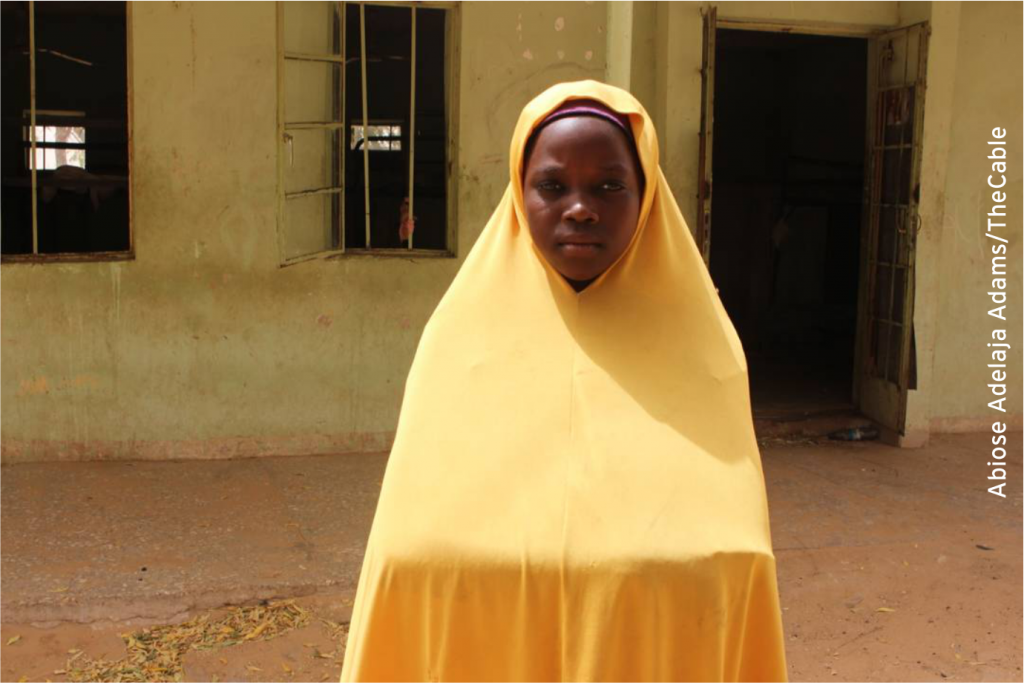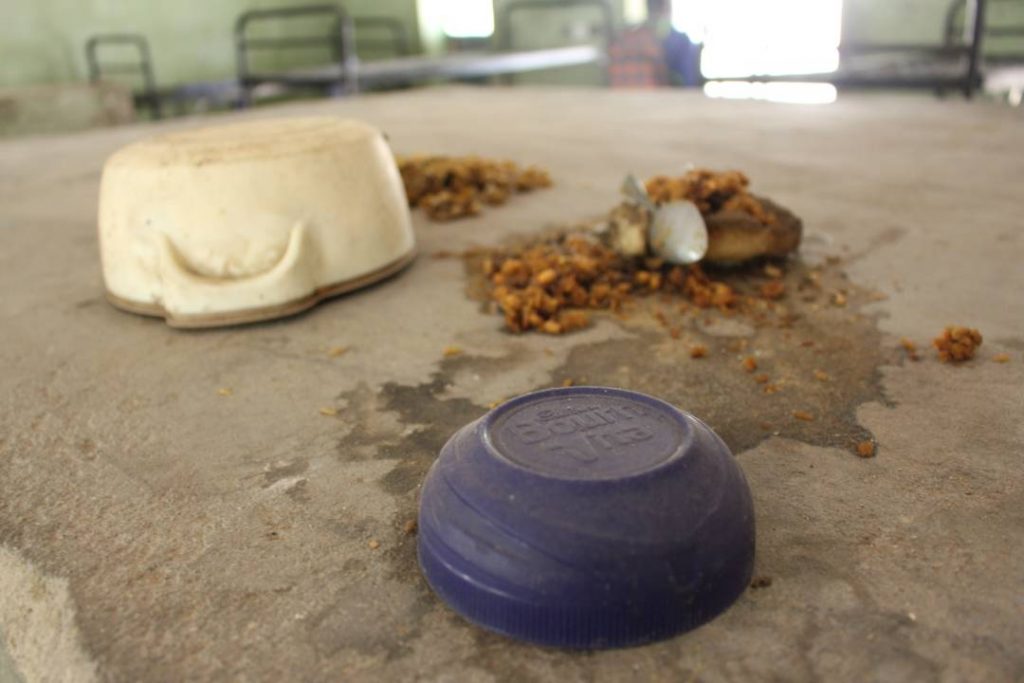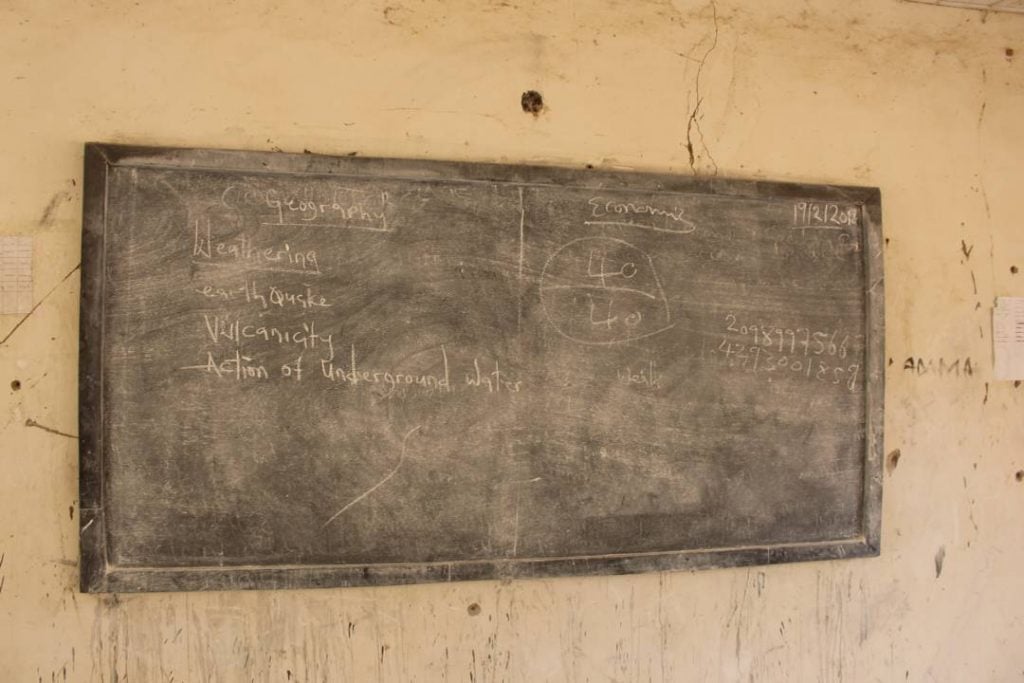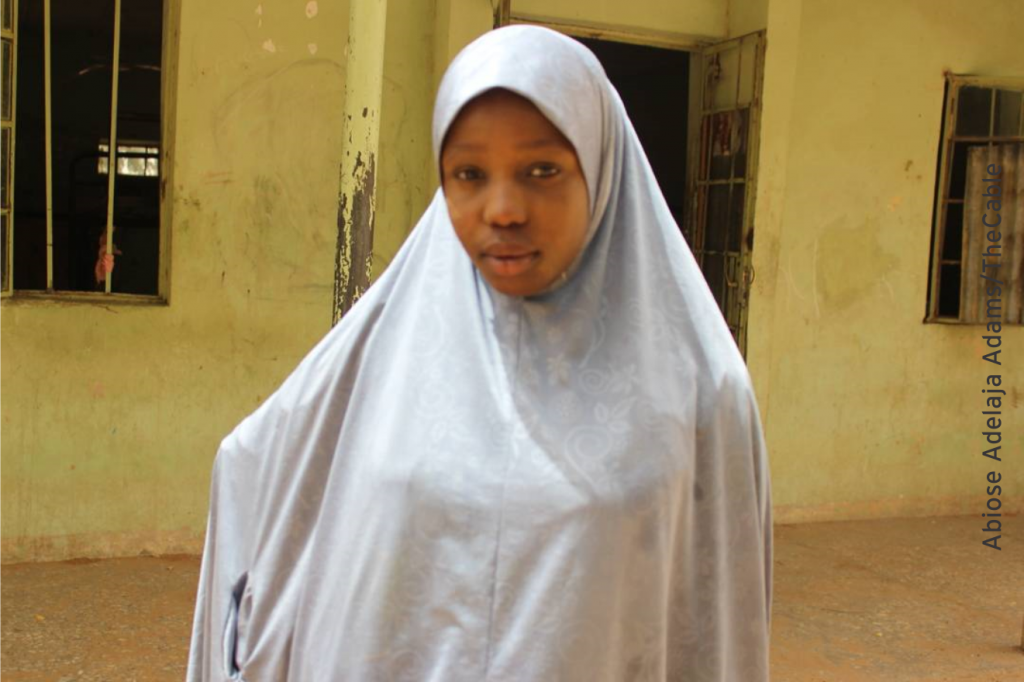
No one knew it was going to be a sad day at school. The blackboard, facing the empty class in ‘Tech 3A’, still bore, in the teacher’s handwriting, 19/2/18. The topic, ‘Weathering’, which they learnt in geography class that day has not yet been erased from the board. And so is their memory of the attack.
At about 5.30pm that Monday, the whistle for the dinner blew. According to the similar accounts of seven girls who spoke to TheCable, the students rushed to the dining to have their meal. The food on the menu was maize and baobab soup.
Some ate theirs while others kept it for later. Shortly after, the Muslims among them quickly had their ablution and rushed to the mosque in response to the call for the 6.30-7pm prayers. And that seems to be the abrupt end of this school renowned to be the best science school for girls in the state.
It’s been over a week since suspected Boko Haram insurgents attacked Government Girls Science and Technical College, Dapchi, in Bursari local government area of Yobe state, north-east Nigeria. While the search for the 110 girls continues, their lucky colleagues are telling their story of the close shave.
‘THE GUNSHOTS’

Ajara: “Our principal was crying”
TheCable meets Ajara Lawal, a 14-year-old SS2 student at the school hostel. She is here to pick some of her belongings.
With all eagerness to tell the world what has happened to her, she says: “We heard gunshots. We were in the mosque. At first, we thought it was an explosion from the transformer. But the shooting continued, so all of us left the mosque and moved towards the school gate. When we got to the gate, we saw some people in soldiers’ uniform, but they don’t look like soldiers, and then we ran back. Our principal was crying, she told us we are not safe that we should run towards the fence and run away.”
Amina Abubakar Mohamadu a 16-year-old, SS2 student, who has now returned to her father’s house at Damaturu, says she just had her dinner when “we started hearing shooting. We all ran out, but the principal told us to start running, that we are not safe”.
Another 14-year-old student of SS2, Yagana Mustapha, said she was one of the girls at the mosque, when they heard the gun. “We ran to the gate. Then they (Boko Haram) lied saying Boko Haram is attacking the village. ‘Come, Come, I want to help you.’
‘TOOL OF DECEPTION’
Their description of the insurgents fits that of those camouflaging to be what they are not. They say they wore military camouflages, but no boots. They drove three canter trucks, painted in army colour and parked outside the school gate. Other witnesses say the insurgents had first attacked the police station and the hospitals. This sent almost all the villagers scampering for safety.
Ajara recalls: “They were wearing soldier’s uniform and they said ‘Come, come, we are here to rescue you’. I even stepped my leg into the car, but my elder sister called and said don’t you see that there is Allahu Akbar is written on their car, that was how I ran out.”
“Me too,” Amina adds. “They deceived us. They came with three vans in army colours and they had army uniform, but they didn’t have army boots, that is how some of us identified them – through the slippers and their military trouser which did not reach the ground — three-quarter length.”
Yagana confirms, revealing: “They wore soldiers uniform. I saw their car. They wrote Allahu Akbar on it. That is why I did not run into it.”
‘WE SCALED FENCE’

Spilled food apparently from the pandemonium
Sadia Mohammed Sanni, the third of 15 children, wants to be a doctor. She is currently in SS2.
“Immediately the incident started, we started running. Our teachers helped us to cross the fence. I was raised to scale over the fence and ran to the neighbour’s house,” she narrates.
The distance the girls must have covered to scale over the school fence cannot be less than 5 kilometres giving the huge landmass of the school.

Unfinished business: Days after the last geography lesson, the location of the missing girls is still a mystery
A look at the frame of Ajara and Yagana one would consider them too frail to scale over the fence, but in this matter, they would rather sustain a fracture than be in the custody of Boko Haram.
“We ran, ran,” Ajara, who speaks through an interpreter, gesticulates with her hand. “Almost 5 kilometres.”
“Our teachers tried for us. They helped us to climb the fence,” Yagana adds.
The state of confusion still at the hostel paints a clearer picture of the pandemonium that must have ensued that evening. The windows and doors, through which the girls jumped out, are still ajar. The slippers they removed to aid their race are still gathered at the hostel’s square. On the wooden lockers are cups and bowls placed upside down. Looking out of stacked metal clothes boxes are red, pink, green checked house-wears, towels, pants and sweaters — some handing loosely on the iron of the double bunk bed.
Plates of food, perhaps the last meal served that evening, are spilled on the shelf. Molds are now comfortably growing on the cupboards and reading tables. Plastic buckets and kettles are upturned, while mattresses, praying mats, passport-sized photos, books and seedlings (for agric experiment) are all strewn on the floor.
Some ceiling fans are still rolling in the empty dormitories, the clock is still ticking while the school’s solar inverter is still humming and providing light to a deserted school.
‘WE SLEPT IN THE BUSH’
Amina is still horrified by the experience. Her father, a civil servant in Damaturu, says in the past one week, she often jerks in her sleep. She wants to become an engineer. She had to sleep in the bush that night, a price to pay for having an ambition.
“I slept in the bush that night. One of my friends was bitten by a snake. Some ran into houses. The next day, the local government chairman of Babangida and Dapchi came to see us and bring some of us back to our parents,” she recalls.
The girls says a teacher had a miscarriage as a result of the rush, while another had a fracture. TheCable could not get any of the teachers to speak with since the school is closed.
WILL THEY GO BACK TO SCHOOL AGAIN?

Fatima doesn’t want to go to school anymore
On her colleagues ran into the car that belonged to the insurgents, Yagana says “they did they not know they are not soldiers. They thought they will help them. That is why they entered the car. Some them were crying and shouting.”
While she is grateful to God for her escape, she prays for her friends’ return.
“I am happy to escape, but I feel sad for my friends and I wish them to come back,” she says.
Amina, the first of her parents’ three daughters, says she cannot return to that school.
“I can’t, because the time they came, they told us that they are coming again. They (Boko Haram) said this is the first time they are in that town, they didn’t know there is school like that, if they know, they will do more than that. So now, as I know they are coming back, I cannot go back there,” she says, but she is willing to go to another school.
Mariam Mohammed Miko, 15, is the seventh child of 12 children. She said though she hopes to be a health technologist so that she can help her community, she is currently discouraged and not willing to return to school for now.
Fatima Mohammed Bilau, the 10th child in a family of 27, shares a similar fear with Mariam. She is 15 years now, but she has at the moment given up on education.
Yagana, however, says she is willing to go back to another school if the government provides security.
“I will go back to school. But let the government protect us,” she says. (The Cable)
No comments:
Post a Comment
Get more stories like this on our twitter @Abdul_Ent and facebook page @abdulkukublogspot